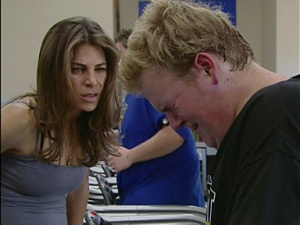I live in a share-house of smart and savvy 20-somethings and despite paying a large amount of rent, our television antenna doesn’t work. Whilst this wasn’t our choice, I have often found myself taking smug pride in the fact that we don’t have a TV, feeling a part of an intellectual elite that refuse to watch the mind-numbing shows created for the numb-of-mind masses.
Yet of a night I sit in my bed and log on to TV-links.net, bypassing the movie section as I head straight to the impressive array of television shows. Skins, Misfits, True Blood and Mad Men were constant companions during a lonely few months in Copenhagen. Californication marathons cemented friendships and Whisker Wars cemented a penchant for bearded men. And when the question was raised in our Week 1 Television Cultures tute “What TV show are you embarrassed to love?” memories of The Simple Life and Passions brought a coy smile to my lips.
Unlike Alan McKee I do not favour television over cinema, radio, books or Art – but it certainly has its place in my heart. Perhaps my regard for television is more akin to the metaphor used in Hollywood: The Rise of TV (2005), likening television to a wife and cinema to a mistress.
I agree with McKee’s sentiment (2007) that television makes me ‘joyful in the encounters it offers with difference‘ and that, drawing upon Thomas Hartley, television is ‘the ultimate cross-demographic medium‘, yet I disagree with the idea that television makes me ‘a better person’ and that it ‘doesn’t want to put anybody offside’. Shows such as The Biggest Loser flourish partly through audience empathy, but partly through mockery by the audience. What could be better than watching fat people cry as they struggle to run up a flight of stairs as I tuck into my fish and chip dinner from the comfort of my couch? – not such a ‘generous, warm, inviting, kind medium’ after all.
Indeed, McKee’s notion of television wanting ‘to bring everybody into the audience, smiling’ is indirectly contested by Graeme Blundell’s exploration of the rise of digital film-making, the consequential levels of realism onscreen and, as a result, the ability to explore ‘subtleties of character against the larger dynamics of the social world’ (2011) that Blundell states captured ‘the high end of the market’. This is glaringly obvious as friends from a certain domestic demographic derive their pleasure and truth from shows such as Today Tonight and Home & Away, while others who dwell in a state of pseudo-intellectual hipsterdom get their rocks off to Battlestar Gallactica, Game of Thrones and Community.
Whilst it would be naiive to say that my viewing habits aren’t influenced by friends and ‘the cool kids’, for now I’m too busy trying to decide if I’m more like Jess from New Girl or Hannah from Girls to even contemplate getting up to speed with what Breaking Bad, The Wire or Parks & Recreation are all about.
REFERENCES
- Blundell, G (2011) ‘The past is another country’, The Australian, 19 Jan, viewed 22 Jul 2012, <http://www.theaustralian.com.au/news/opinion/the-past-is-another-country/story-e6frg8qo-1225991177193>.
- Hollywood: The Rise of TV (2005) course screening from COMM1073, RMIT University, viewed 20 July 2012.
- McKee, A (2007) ‘Why Do I Love Television So Very Much?’, blog article, 9 Mar, Flow, viewed 22 Jul 2012, <http://flowtv.org/2007/03/why-do-i-love-television-so-very-much/>.




